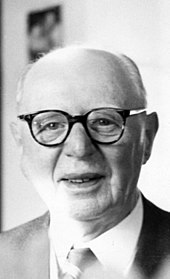Albrecht Landwehr
Albrecht Landwehr (born May 7, 1881 in Bielefeld ; † March 25, 1966 in Wuppertal ) was a German lawyer and politician and from July 1, 1919 to 1929 mayor of the city of Vohwinkel and the first post-war mayor of the city of Wuppertal in 1945.
Life
Albrecht Landwehr was born in Bielefeld in 1881 as the son of the engineer Johann Landwehr and his wife Anna. He attended high school in Bielefeld, where he passed the school leaving examination in 1901. During his studies he became a member of the Alemannia Bonn fraternity in 1901 . In December 1906 he was court clerk , put 1910 in Erlangen legal doctoral examination and was 1912 Gerichtsassessor . From January 1906 to March 1912 he worked as a trainee lawyer and assessor at various court authorities and from 1912 to 1917 city assessor in Remscheid, where he was an alderman until June 30, 1919. In 1912 he married Erna Meyer-Hermann. From this marriage there were four children.
mayor
On July 1, 1919, he was entrusted with the administration of the Vohwinkel mayor by the Upper President of the Rhine Province and was elected mayor on October 14, 1921. Until the town union in 1929 he directed the fortunes of the then independent Vohwinkel, which received town charter in 1921. In 1923, during the French occupation, he was not prepared to work with the occupiers, was arrested as the first victim of the state of siege ( Ruhrkampf ) and only released in the unoccupied zone. From Sonnborn he was able to carry out the administrative business as mayor of Wuppertal. Landwehr led the negotiations for the unification of the cities of Vohwinkel and Elberfeld and was active as a city councilor in various offices in Wuppertal in the 1930s. In 1936 he was appointed city treasurer. In 1937 Landwehr joined the NSDAP ( membership number 5,679,631). After the war, the American Landwehr handed over management of the administration as Wuppertal's first post-war mayor. His successor Eugen Thomas did not become the official "Lord Mayor" until May 5, 1945 . On August 1, 1945, he retired at the age of 64.
Other functions
In his early years he had already worked on a voluntary basis in various associations of the voluntary welfare organization. For more than 20 years he was a member of the board of the Rhenish Provincial Committee for Inner Mission in Langenberg. He joined the board of directors of the Bergisches Diakonissen-Mutterhaus in 1937. He was chairman for 20 years. Under his leadership, the parent company in Wuppertal-Elberfeld, which was destroyed in the war, was rebuilt. In Aprath-Oberdüssel and in Bensberg-Moitzfeld, several curative educational homes for children and young people who have left school were built. Landwehr was particularly interested in the Evangelical Seminar for Social Work in Wuppertal-Elberfeld, which was the first of its kind in West Germany to look back on 50 years of existence in the 1960s.
Honor
- Johann-Hinrich-Wichern plaque from the Diakonisches Werk-Innere Mission and aid organization of the Evangelical Church in Germany .
literature
- Helge Dvorak: Biographical Lexicon of the German Burschenschaft. Volume I: Politicians. Volume 3: I-L. Winter, Heidelberg 1999, ISBN 3-8253-0865-0 , p. 224.
Web links
- Literature by and about Albrecht Landwehr in the catalog of the German National Library
swell
- General-Anzeiger Stadt Wuppertal July 1, 1944
- General-Anzeiger Stadt Wuppertal March 29, 1966
- General-Anzeiger Stadt Wuppertal April 1, 1966
| personal data | |
|---|---|
| SURNAME | Landwehr, Albrecht |
| BRIEF DESCRIPTION | German lawyer, politician and Lord Mayor of Wuppertal |
| DATE OF BIRTH | May 7, 1881 |
| PLACE OF BIRTH | Bielefeld |
| DATE OF DEATH | March 25, 1966 |
| Place of death | Wuppertal |
